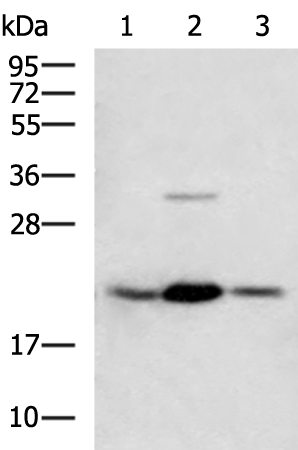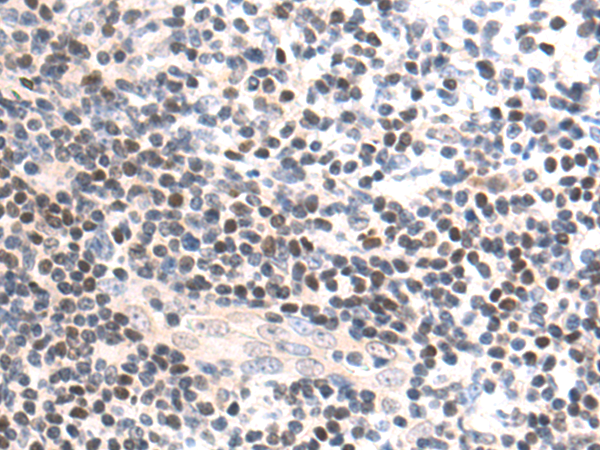

| WB | 1/1000-1/5000 | Human,Mouse,Rat |
| IF | 咨询技术 | Human,Mouse,Rat |
| IHC | 1/50-1/200 | Human,Mouse,Rat |
| ICC | 技术咨询 | Human,Mouse,Rat |
| FCM | 咨询技术 | Human,Mouse,Rat |
| Elisa | 1/5000-1/10000 | Human,Mouse,Rat |
| WB Predicted band size | 22 kDa |
| Host/Isotype | Rabbit IgG |
| Antibody Type | Primary antibody |
| Storage | Store at 4°C short term. Aliquot and store at -20°C long term. Avoid freeze/thaw cycles. |
| Species Reactivity | Human |
| Immunogen | Fusion protein of human MGMT |
| Formulation | Purified antibody in PBS with 0.05% sodium azide and 50% glycerol. |
+ +
以下是3篇与MGMT抗体相关的代表性文献摘要整理:
---
1. **文献名称**:*MGMT Gene Silencing and Benefit from Temozolomide in Glioblastoma*
**作者**:Hegi ME, et al.
**摘要**:该研究通过甲基化特异性PCR分析胶质母细胞瘤患者MGMT启动子甲基化状态,发现甲基化患者对替莫唑胺化疗反应更佳,总生存期显著延长(NEJM, 2005)。
---
2. **文献名称**:*Immunohistochemical Detection of MGMT Protein and Correlation with Promoter Methylation in Gliomas*
**作者**:Preusser M, et al.
**摘要**:比较免疫组化(MGMT抗体)与甲基化检测的一致性,发现两者相关性中等,建议联合使用以提高预后评估准确性(Acta Neuropathol, 2008)。
---
3. **文献名称**:*MGMT Testing in Glioblastoma: From Biology to Clinical Decision-making*
**作者**:Wick W, et al.
**摘要**:综述MGMT检测方法(抗体IHC、甲基化分析等),强调其在指导胶质瘤个体化治疗中的作用,并讨论标准化检测的挑战(Nat Rev Neurol, 2014)。
---
**扩展方向**:若需更早期经典文献或特定技术(如抗体克隆号验证),可进一步补充。
**Background of MGMT Antibody**
The MGMT (O⁶-methylguanine-DNA methyltransferase) antibody is a critical tool in cancer research and diagnostics, particularly in glioblastoma and other malignancies. MGMT is a DNA repair enzyme that removes alkylating adducts, such as O⁶-methylguanine lesions induced by chemotherapeutic agents like temozolomide (TMZ). High MGMT expression in tumor cells confers resistance to alkylating therapies by rapidly repairing DNA damage, thereby reducing treatment efficacy.
Epigenetic silencing of the *MGMT* gene via promoter methylation is a key biomarker in clinical oncology. Methylation inhibits transcription, leading to reduced MGMT protein levels, which correlates with better patient responses to TMZ and improved survival in glioblastoma. MGMT antibodies are widely used in immunohistochemistry (IHC) to detect protein expression in tumor tissues, providing complementary data to molecular assays like methylation-specific PCR.
However, discrepancies between MGMT promoter methylation status and protein expression have been reported, emphasizing the need for standardized detection methods. Clinically, MGMT assessment guides therapeutic decisions, identifying patients likely to benefit from alkylating agents. Research also explores MGMT's role in other cancers and its potential as a prognostic marker. Despite technical challenges in antibody specificity and quantification, MGMT remains a pivotal biomarker in personalized oncology.
×